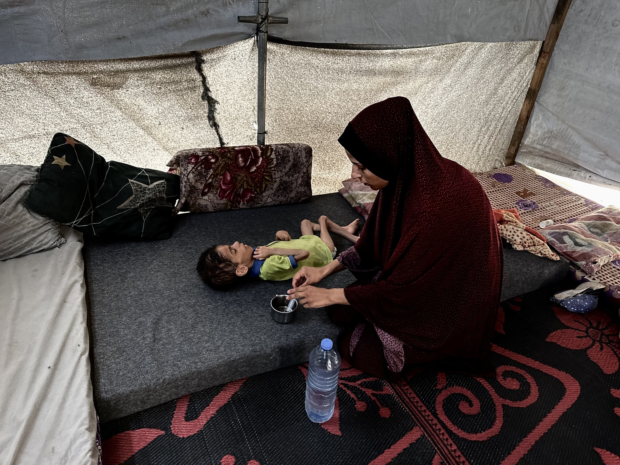
GAZA — In the heart of Gaza, where the echoes of war have become a painful melody of survival, a heartbreaking story unfolds in a small hospital room. Shawq Ayyad, a mother in her thirties, watches helplessly as her infant son, Sanad, fights a desperate battle against a severe medical condition triggered by the relentless Israeli aggression that has plagued the region for over a year.
The unseen battle
Shawq Ayyad’s pregnancy, which should have been a time of anticipation and joy, was overshadowed by the relentless bombardments and the harsh realities of war.
Living amidst the ceaseless violence and displacement, Shawq was exposed to toxic fumes from airstrikes and faced severe shortages of food and essential vitamins. These dire conditions took a toll on her health and, tragically, on the health of her unborn child.
When Sanad was born, his arrival was marred by the grim reality of his condition. Diagnosed with hydrocephalus, a serious condition characterized by the abnormal accumulation of cerebrospinal fluid in the brain, Sanad faces partial paralysis and significant sensory issues. The grim diagnosis came as a cruel reminder of the ongoing violence’s far-reaching consequences.
A medical crisis
In Gaza’s Al-Aqsa Martyrs Hospital, where Sanad’s plight is becoming increasingly dire, the infant lies connected to a myriad of medical devices. Despite several surgeries aimed at alleviating his condition, the limited medical resources in the region have been insufficient for his recovery.
Gaza’s healthcare system, already stretched thin, struggles to provide the specialized care that Sanad urgently needs.
Shawq recounts her harrowing experience to a reporter from Anadolu Agency. “During my pregnancy, the toxic gases from the bombings caused me severe breathing difficulties, which I believe impacted my baby,” she says, her voice breaking with anguish.
“Here in Gaza, my son has undergone numerous surgeries, but he desperately needs treatment beyond our borders—a treatment that is simply out of reach due to the ongoing blockade and war.”
A blockade of despair
The blockade imposed by Israel has further compounded the suffering of Gaza’s residents. The closure of the Rafah crossing and other vital supply routes has effectively trapped thousands in dire conditions.
For those like Sanad, who need specialized medical equipment and treatments unavailable locally, this blockade means a grim fate without access to necessary care.
Shawq highlights the critical shortages in Gaza, noting that her son requires feeding tubes, sterilization equipment, and other medical supplies that are simply not available. The situation is dire, with basic survival necessities becoming increasingly scarce.
A humanitarian crisis
The broader humanitarian crisis in Gaza affects thousands more. Recent statistics reveal that approximately 3,500 children face life-threatening conditions due to malnutrition, while around 10,000 cancer patients are in urgent need of treatment outside the region.
The continuous blockade and restriction on resources have exacerbated the suffering of the population, rendering basic healthcare and survival supplies alarmingly insufficient.
Since the outbreak of the Israeli offensive on October 7, 2023, Gaza has been cut off from essential services. The destruction of infrastructure, including the sole power plant, has led to widespread outages and a halt in critical supplies. The international aid reaching Gaza is limited, failing to meet the burgeoning needs of its inhabitants.
Hope amid despair
In the midst of this overwhelming adversity, Shawq clings to a fragile thread of hope. She yearns for a day when Sanad can receive the treatment he desperately needs. Her hope is not just for her child but for countless others who suffer in silence, waiting for a glimmer of relief in a land engulfed by conflict.
WAFA
